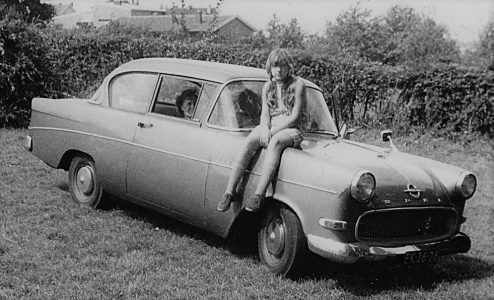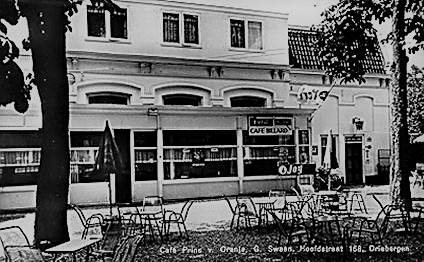
YOU’LL HAVE TO WALK HOME
Written by Bert Plomp
After the Solex era, a period of some prosperity dawned at home. My father and mother had gathered enough money through various side jobs to purchase their first automobile. The cigar shop in our square was a true businessman. He not only had an excellent assortment of tobacco products but also had a good sense of timing. He knew exactly when it was time to part with a beloved car, for example, to a simple insurance agent like my father. My father bought two cars from him, and neither vehicle lasted very long.
The first car was a red Opel Rekord, and the second was a Ford Taunus. I had particularly bad experiences with the first car when I still lived at my parents’ home. Almost every weekend, just as the caravan was about to set course for the campsite, the cursed engine of the vehicle would fail. Along with my two brothers and friends from the neighbourhood, I had to push that darned car almost halfway to Bunnik. Even then, the engine often wouldn’t start, and we had to call the roadside assistance (ANWB).
There was a time when, once we were out of the city, we had to seek help from a passing scrap collector. We then hitched his horse to the car.
When the car needed to be pushed again, my father, mother, and my sister would comfortably remain seated on the plush car seats. With a hint of amusement in their eyes, both ladies would gaze through the rear window at the labourers behind the car. It’s a miracle that one of the pushers never collapsed on the asphalt with a heart attack. The return journey also rarely went without problems.
Along with my friends Fred and Willem from the Adriaen van Ostade Lane, I, as a 17-year-old, frequently went out in Driebergen. We visited ‘De Prins van Oranje,’ a cafe-dancing establishment where bands like The Blue Diamonds performed on weekends.
As city boys, we could always count on the attention of attractive local girls. However, this interest usually didn’t sit well with the local young men, often leading to an aggressive attitude on their part. When the evening came to an end, we had to make sure to leave the dance floor in time and give the girls their last kisses. This was just in time to reach the bus stop across from the dancing, allowing us to slip into the arriving bus immediately. This way, we avoided fights with these jealous boys. Most of the time, the violence was limited to some banging fists on the bus windows.
Fred and Willem both worked while I was still in school. They always had enough money to dress well and go out. I had to be more frugal with the money from my paper route. Nevertheless, I could afford a white denim suit, just like the brothers.
Once when we went to ‘De Prins van Oranje,’ the three of us were dressed in white. We had taken the train to Driebergen and then, like pop stars, had a taxi drop us off right at the entrance of the dancing. We made such an impressive entrance that it was widely assumed we were members of a well-known band. A trio of pop artists who deigned to check out Driebergen. We enjoyed playing that role. The whole evening, we were surrounded by lovely girls. However, people were also eagerly anticipating the moment we would take the stage. The climax of the evening. The moment when we would showcase our musical talents.
Even the members of the performing band were somewhat bewildered by our presence. When, halfway through the evening, they generously offered us their instruments, we had no choice but to perform. After climbing onto the stage, we could produce nothing better than a racket. At least, that was my idea. Fred and Willem played some guitar, and I could produce some notes from my harmonica. It was a brief performance, even shorter than The Stones’ first concert at the Kurhaus in Scheveningen.
We didn’t have a repertoire either. After five minutes, we stepped off the stage with the plan to blend in with the crowd for the rest of the evening.
To our great surprise, our audience seemed quite enthusiastic about our musical contribution. Due to this resounding success, we lost track of time and missed the last bus to Utrecht.
Suddenly, I thought my father might be willing to come pick us up with the car. After all, we had helped him so many times by pushing his old Opel. When I finally reached my father on the phone late at night, he responded bluntly, “You’ll have to walk home.”
Dressed in our white suits, we wandered around almost the entire night. Strolling along the Arnhem-Utrecht railway line, we only arrived home at four in the morning. Along the way, we visited some orchards to satisfy our hunger.
Once again, it turned out to be quite a challenge to cover the Driebergen-Utrecht route in one piece.

